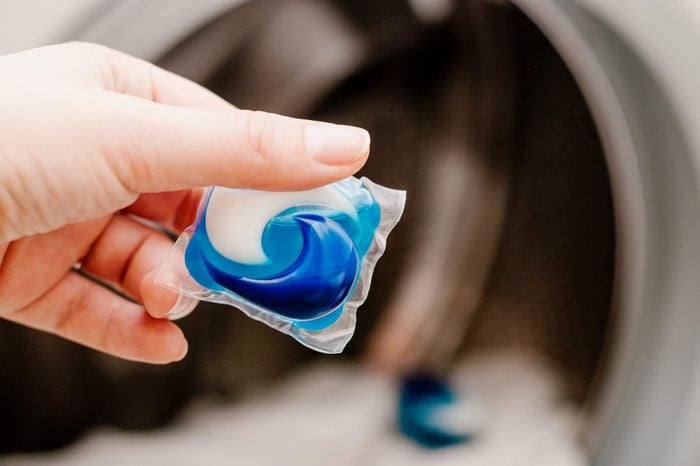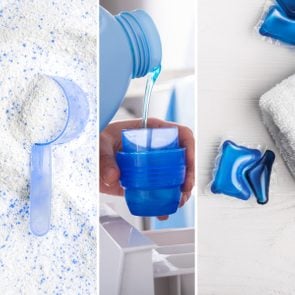Are Laundry Pods Bad for the Environment? Here’s What You Need to Know
Updated: Apr. 18, 2024

New findings suggest that plastic film from laundry pods may be polluting our water
Laundry pods have quickly become consumer favorites. People love the mess-free convenience of the pre-measured packets that dissolve in the washer, and many have switched from traditional liquid or powder detergent for that very reason. It’s estimated that over 20 billion plastic laundry and dishwasher pods are used every year.
But are laundry and dishwasher pods safe for the environment? New research suggests they may not be. It turns out that laundry pods’ film wrapping—the part that dissolves in the wash—is made of polyvinyl alcohol (PVA), a plastic that isn’t biodegradable.
Why are laundry pods bad for the environment?
A study in the International Journal of Environmental Research and Public Health shows that over 75% of intact plastic particles from laundry and dishwasher pods can be released into oceans, rivers, canals and soil. In wastewater, this plastic film has the potential to absorb dangerous chemicals or contaminants, antibiotics, or heavy metals at high concentrations and then work their way up the food chain.
Clean-water advocates say what’s most concerning is that consumers don’t even realize laundry pods contain plastic. “We want everyone to understand in simple terms that pods are plastic and PVA is an unknown substance making its way into our waterways and our bodies,” says Julia Cohen, co-founder and managing director of Plastic Pollution Coalition, a nonprofit advocacy organization that works against plastic pollution.
What should I know about detergent pods?
The Plastic Pollution Coalition, along with Blueland, a company that makes eco-friendly cleaning products, announced a formal action to petition the U.S. Environmental Protection Agency to prohibit the use of PVA in consumer goods, including all laundry detergent pods and sheets. They hope to garner support from the public with their petition.
“When we started our research into the laundry category, we were shocked to learn that the film that individually wraps laundry pods is actually plastic,” says Sarah Paiji Yoo, Blueland co-founder. “Even more surprising was how many industry veterans knew these pods were not readily biodegradable, given they were made of petroleum-based synthetic plastic, and yet they continued to encourage their use of it.”
Yoo says that because no official research has been done on what actually happens to plastic pods after a wash cycle, the situation is an environmental gray area. That’s why Blueland helped fund the study that was published in the International Journal of Environmental Research and Public Health.
While the study reached no definitive conclusions, researchers raised the red flag, since billions of pods dissolve down the drain every year. “Very little research exists that aims to monitor the biodegradability of PVA in the natural environment,” the study’s authors wrote. “Improving upon this research is essential for better understanding the link between PVA usage, and public and environmental health”
Sources:
- International Journal of Environmental Research and Public Health: Degradation of Polyvinyl Alcohol in US Wastewater Treatment Plants and Subsequent Nationwide Emission Estimate


